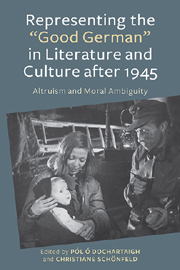Book contents
- Frontmatter
- Contents
- List of Illustrations
- Acknowledgments
- Introduction: Finding the “Good German”
- 1 Re-Presenting the Good German: Philosophical Reflections
- 2 “Görings glorreichste Günstlinge”: The Portrayal of Wilhelm Furtwängler and Gustaf Gründgens as Good Germans in the West German Media since 1945
- 3 From Hitler's Champion to German of the Century: On the Representation and Reinvention of Max Schmeling
- 4 Wilhelm Krützfeld and Other “Good” Constables in Police Station 16 in Hackescher Markt, Berlin
- 5 The “Good German” between Silence and Artistic Deconstruction of an Inhumane World: Johannes Bobrowski's “Mäusefest” and “Der Tänzer Malige”
- 6 Saints and Sinners: The Good German and Her Others in Heinrich Böll's Gruppenbild mit Dame
- 7 Being Human: Good Germans in Postwar German Film
- 8 “The Banality of Good”? Good Nazis in Contemporary German Film
- 9 Memories of Good and Evil in Sophie Scholl — Die letzten Tage
- 10 Deconstructing the “Good German” in French Best Sellers Published in the Aftermath of the Second World War
- 11 Macbeth, Not Henry V: Shakespearean Allegory in the Construction of Vercors's “Good German”
- 12 A Good Irish German: In Praise of Hugo Hamilton's Mother
- 13 Shades of Gray: The Beginnings of the Postwar Moral Compromise in Joseph Kanon's The Good German
- Works Cited
- Filmography
- Notes on the Contributors
- Index
3 - From Hitler's Champion to German of the Century: On the Representation and Reinvention of Max Schmeling
Published online by Cambridge University Press: 05 June 2013
- Frontmatter
- Contents
- List of Illustrations
- Acknowledgments
- Introduction: Finding the “Good German”
- 1 Re-Presenting the Good German: Philosophical Reflections
- 2 “Görings glorreichste Günstlinge”: The Portrayal of Wilhelm Furtwängler and Gustaf Gründgens as Good Germans in the West German Media since 1945
- 3 From Hitler's Champion to German of the Century: On the Representation and Reinvention of Max Schmeling
- 4 Wilhelm Krützfeld and Other “Good” Constables in Police Station 16 in Hackescher Markt, Berlin
- 5 The “Good German” between Silence and Artistic Deconstruction of an Inhumane World: Johannes Bobrowski's “Mäusefest” and “Der Tänzer Malige”
- 6 Saints and Sinners: The Good German and Her Others in Heinrich Böll's Gruppenbild mit Dame
- 7 Being Human: Good Germans in Postwar German Film
- 8 “The Banality of Good”? Good Nazis in Contemporary German Film
- 9 Memories of Good and Evil in Sophie Scholl — Die letzten Tage
- 10 Deconstructing the “Good German” in French Best Sellers Published in the Aftermath of the Second World War
- 11 Macbeth, Not Henry V: Shakespearean Allegory in the Construction of Vercors's “Good German”
- 12 A Good Irish German: In Praise of Hugo Hamilton's Mother
- 13 Shades of Gray: The Beginnings of the Postwar Moral Compromise in Joseph Kanon's The Good German
- Works Cited
- Filmography
- Notes on the Contributors
- Index
Summary
Modern sport, as an area of intense popular interest, commercial investment, and, on occasion, political resonance, has produced innumerable “legendary” figures, personalities whose achievements are invested with what Joyce Carol Oates refers to as “mythopoetic” status: “To be a great champion, like Muhammad Ali, one must transcend the perimeters of sport itself to become a model (in some cases a sacrificial model) for the general populace, image-bearer for an era.” Muhammad Ali is certainly one of the best examples of this phenomenon; this article will scrutinize another. The former boxer Max Schmeling (1905–2005), though he was at his athletic peak in the 1920s and 1930s (he was the first German world champion, a title he held between 1930 and 1932), remained both prominent and admired in the Federal Republic after the war, and retained this status even at an advanced age in a reunified Germany. He seems to have represented both success in sport and in his private life, and to have been admired for qualities of character and ethics. The particular combination allowed him to be perceived as a role model for successive generations of Germans, and reflects the double bind experienced by many Germans as they sought to negotiate a path between the crimes of the past and a successful future. Schmeling's exemplary status derived from a life that, on the one hand, seemed to display demonstrable selflessness and, on the other, to have been shaped by a single-minded drive to succeed. “Goodness” was an essential condition of this “greatness,” but, as this essay will argue, it is inseparable from the conspicuous success he enjoyed; indeed, Schmeling became a model German, in the era of West Germany’s economic miracle and postwar recovery, by reconciling the potential conflict between moral qualities and the will to succeed.
- Type
- Chapter
- Information
- Representing the "Good German" in Literature and Culture after 1945Altruism and Moral Ambiguity, pp. 50 - 65Publisher: Boydell & BrewerPrint publication year: 2013



